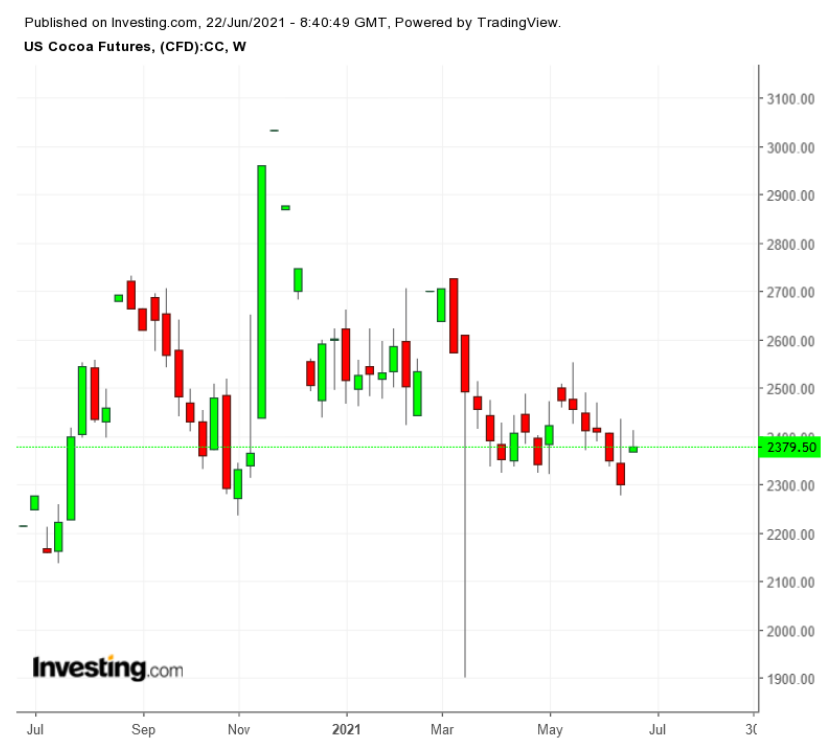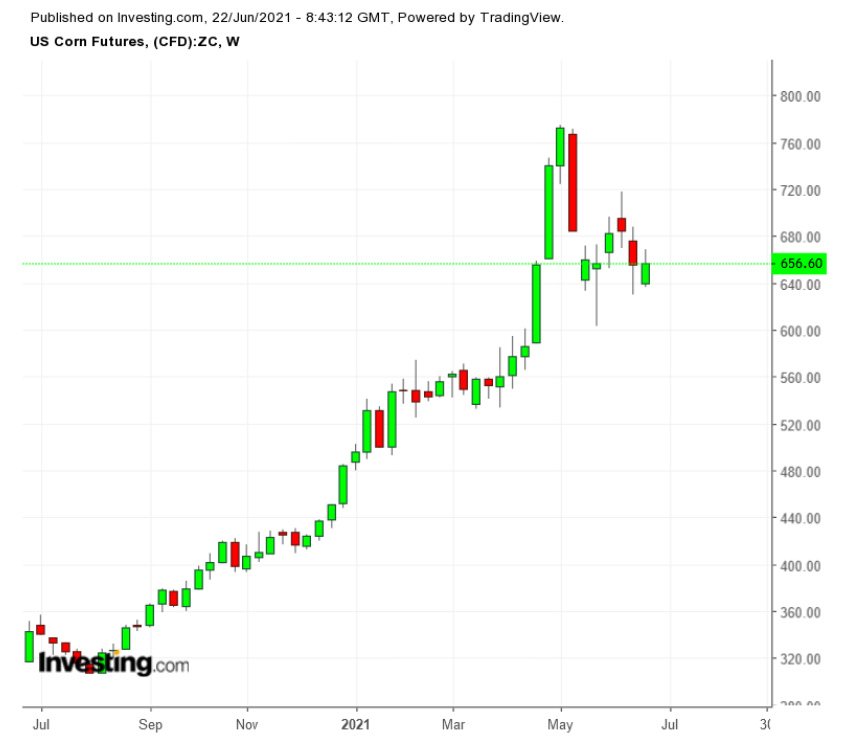Prices of cocoa are down almost 9% on the year while futures of frozen concentrated orange juice are trading about 4% lower.

Just don’t expect that bar of Kitkat or cup of hot chocolate at Starbucks (NASDAQ:SBUX) or Dunkin, or that bottle of Tropicana orange juice (NASDAQ:PEP) at the store to get any cheaper.
Even in ordinary times, commodity price reductions almost never get translated into cheaper prices for processed food. What about in the pandemic era? The most appropriate phrase in relation to this now would be: “Perish the thought!”
Actually, there are good reasons why the fluctuations in commodities alone do not influence swings in food prices, and it doesn’t have to do with just producers' resolve for market stability and customer preservation.
Logistics, including supply chains, are the bigger determinant for manufacturers to ensure that the raw materials they need arrive promptly for them to turn out their merchandise, which in return needs to go out to customers. So long as these aren’t disrupted, food prices do not have much reason to change, albeit the changes in raw materials prices which manufacturers typically try and absorb as much as possible before passing on to customers.
It’s Not Just Food Raw Materials; Think Cardboards, Plastics Too
Of course now, supply chains across the world are broken, complicating not just the delivery of produce for factories to turn into food but also things like resin that are needed to make cardboards and plastic jugs for shipping (think of that Tropicana juice bottle).
In years past, it’s often one product or stream of supply that gets affected, turning the world’s focus to that crisis, and ensuring as speedy a remedy as possible. Today, whole industries are in a jam from the global shortage of microchips to the shortage of glass for bottling after a year of uneven productivity for these critical materials no thanks to the pandemic.
And raising prices, even when commodity costs are falling, is easier when the entire competition is hurting—not just you. It probably explains why McDonald’s (NYSE:MCD) doubled the price of its cheapest sandwich—the McChicken—this year after using its Dollar Menu for years to get customers in the door.
The Wall Street Journal noted in a commentary two weeks ago that “the world hasn’t seen such across-the-board commodity-price increases since the beginning of the global financial crisis, and before that, the 1970s.”

It cited record prices for lumber, copper and iron ore; eight-year peaks in corn, wheat soybeans; and more than two-year highs for oil.
Fed Chief Will Have A Lot Of Explaining To Do Today
Thus, when Federal Reserve Chairman Jerome Powell delivers his congressional testimony today, via satellite link, to the House Select Subcommittee on the Coronavirus Crisis to explain the Fed’s emergency lending programs and policies, expect him to dwell on supply chains and how they are messing up the central bank’s work on US economic recovery.
Friday’s data on personal income and spending will be closely watched as it contains the core Personal Consumption Expenditure Index, which is the Fed’s favored measure of inflation. The PCE Index jumped to a multi-year high of 3.6 percent in the 12 months to April. The more popular Consumer Price Index, meanwhile, grew by 5.0% in the year to May, its fastest since 2008.
Almost every Fed chief introduces a new term to the economic lexicon and Powell’s would either be “transitory” or “transient”—his choice of phrase for describing the post-pandemic inflation in the United States and why this will ease as the country’s broken supply chains get fixed.
For months, Powell has been selling the idea that current US price pressures are temporary, despite many Americans feeling they are here to stay—will only worsen. Last Thursday, the White House surreptitiously gave the Fed a helping hand, via a published study on the pandemic and its disruption of supply chains, to bolster the central bank’s argument.
While the White House made no attempt to play down the seriousness of the crisis before the nation, it concluded that the situation may be resolved before the end of the year—in six months, to be precise. In some parts of the country, things were already performing better than in pre-pandemic times, only that the people many not be aware, the study said.
Inflation IS 'Transitory' White House Says, Backing Fed
Referring to manufacturer surveys carried out by none other than three regional Fed banks, the White House said current delivery times are at record highs while future delivery times were indicated to be in typical ranges.
“There is evidence indicating that the current disruptions are likely to be mostly transitory,” the White House concluded, using Powell’s favorite language.
It added:
“While current indices report conditions at the time of the survey, the future indices report expectations about conditions in six months. Taken together, the data suggest that manufacturers anticipate current supply-chain issues will have abated within six months or so.”
But the study also emphasized the imminent pain both manufacturers and their customers will likely face, saying:
“While markets will eventually adjust, they can be slow and the impact on producers and consumers can be costly. The public sector can play a valuable role in reducing these costs by facilitating short-term adjustments and by addressing vulnerabilities in US supply chains.”
The White House cited for instance the shortage of coffee a decade back and the resultant price surge then.
“As some coffee drinkers can remember, coffee prices have spiked repeatedly due to frosts that damage coffee harvests, most recently in late 2010. Each time, the weather normalized, harvests improved, and prices fell back towards their previous levels. Similar transitory price spikes have occurred in markets for agricultural goods and other commodities—peanut butter amid a drought in 2011, or eggs amid an outbreak of bird flu in 2015.”
Disclaimer: Barani Krishnan uses a range of views outside his own to bring diversity to his analysis of any market. For neutrality, he sometimes presents contrarian views and market variables. He does not hold a position in the commodities and securities he writes about.
